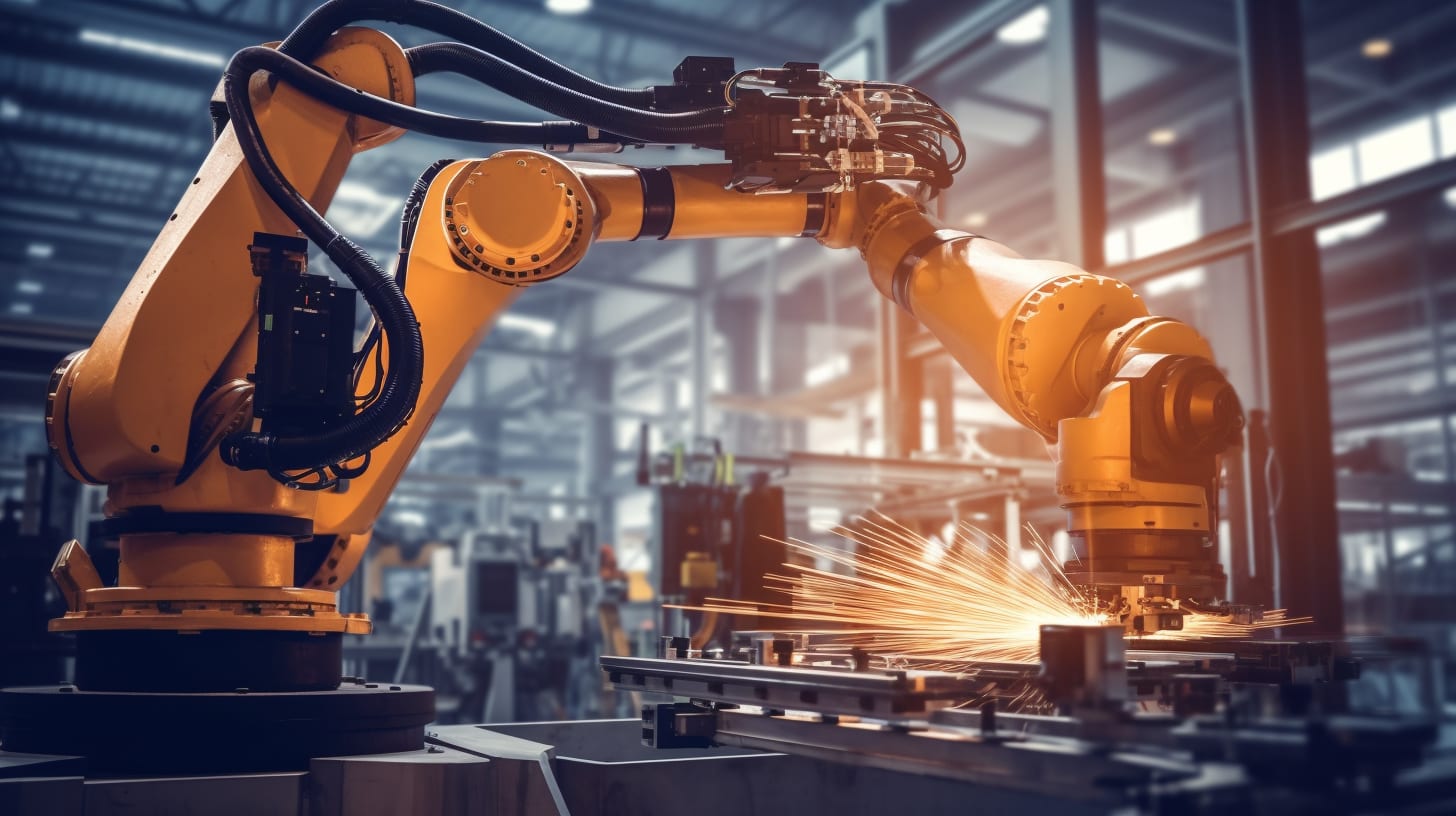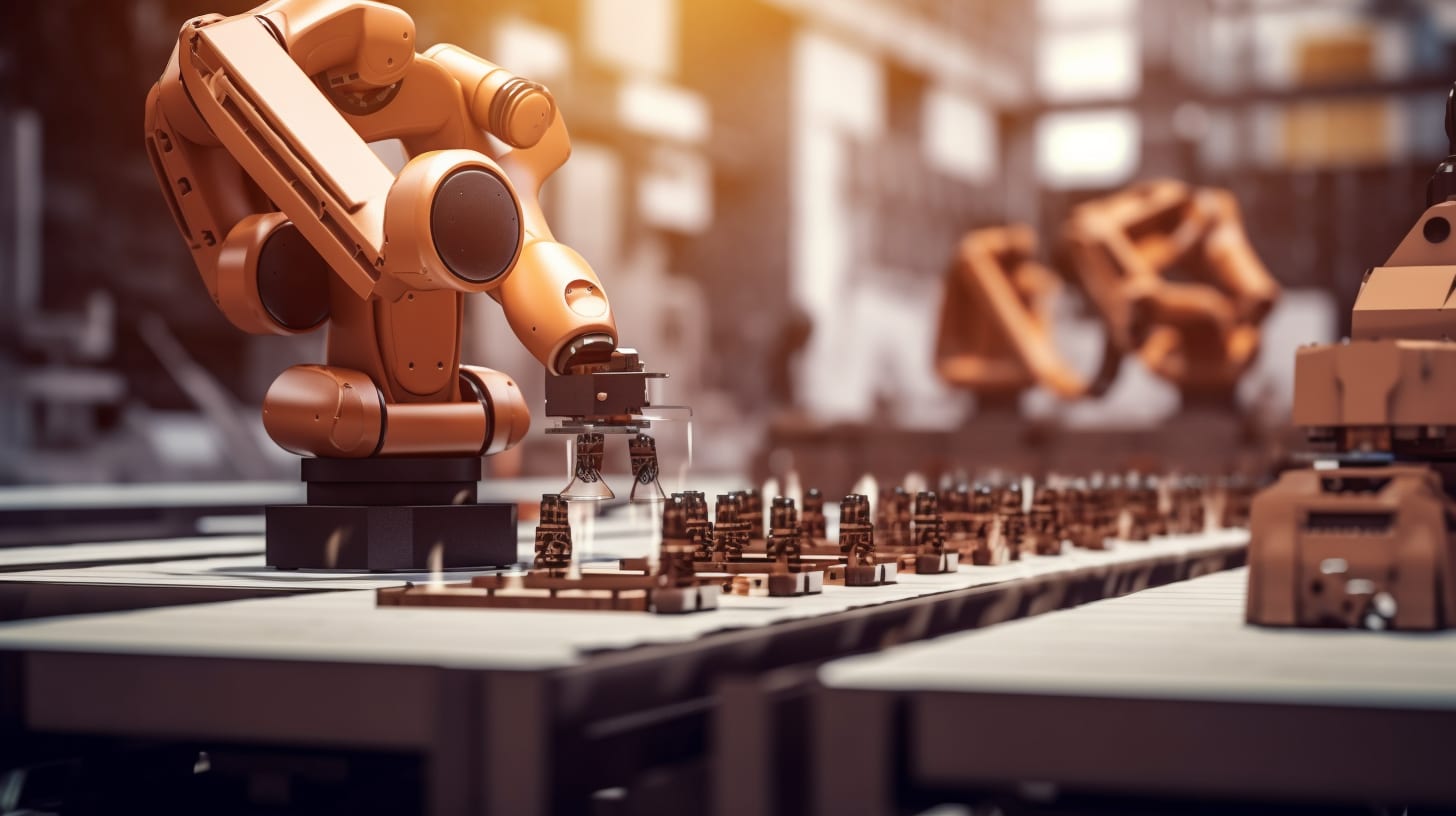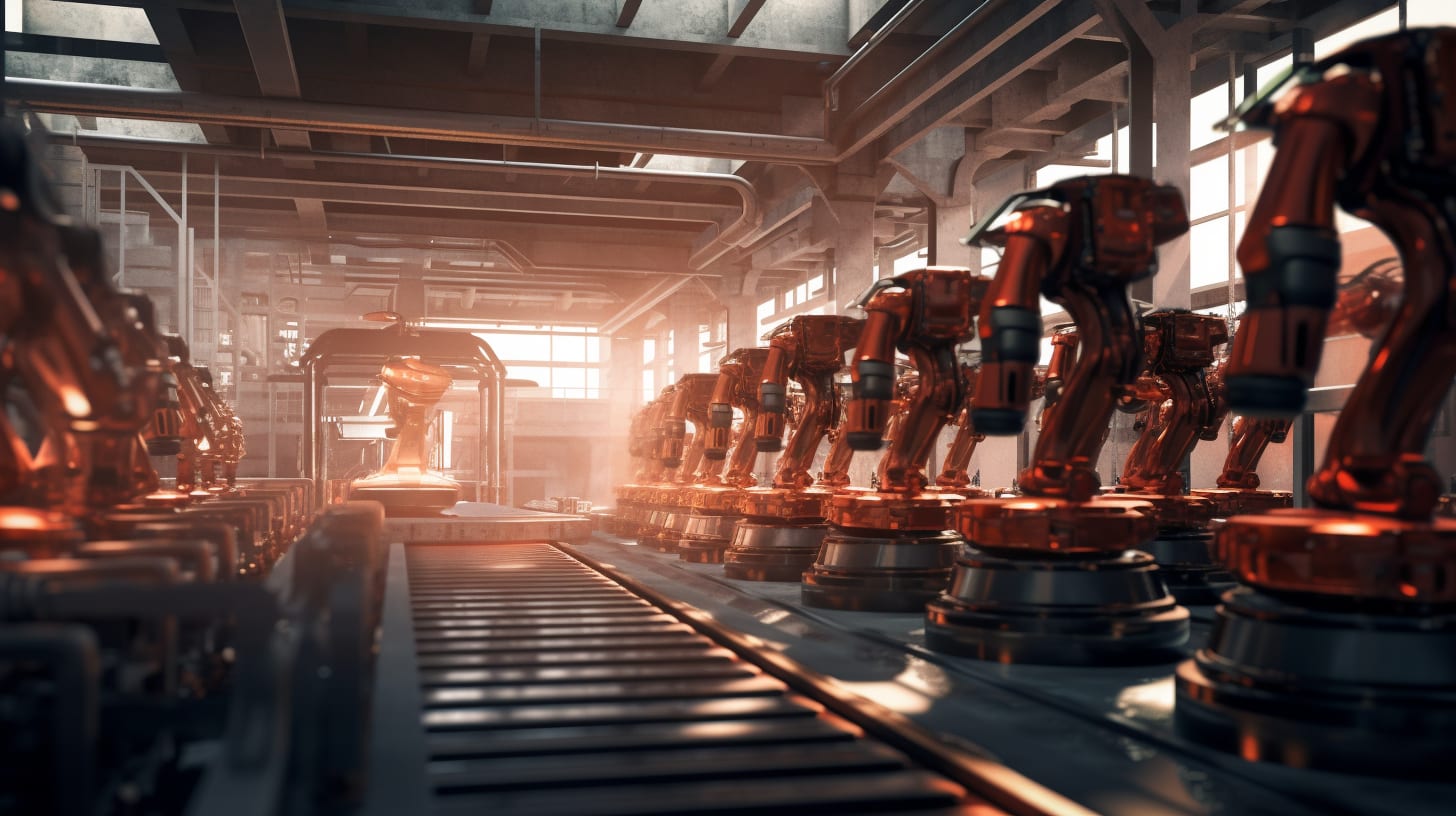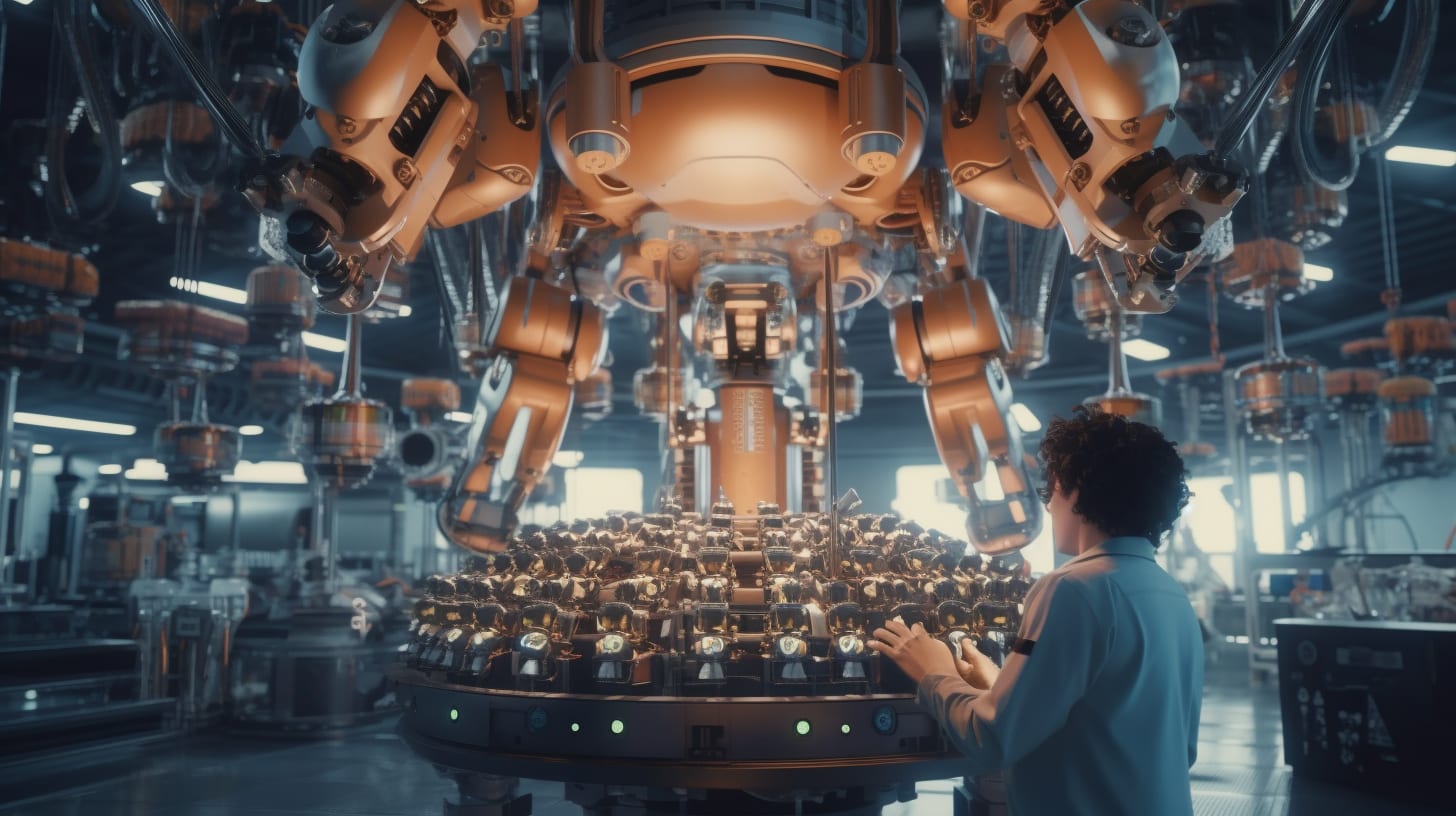The manufacturing industry is undergoing a radical transformation driven by AI in manufacturing. From predictive maintenance to quality control, AI is revolutionizing every aspect of the manufacturing process. In this blog post, we will explore various AI applications that are shaping the future of manufacturing and discuss how these innovations are paving the way for smarter, more efficient production facilities.
Short Summary
- Harness AI for predictive maintenance and computer vision to revolutionize quality control.
- Streamline processes with RPA, optimize supply chain management, and transform warehouse operations with AI-driven solutions.
- Leverage generative design & digital twins to enhance product development while overcoming challenges of implementation in manufacturing industry.
Harnessing AI for Predictive Maintenance
The integration of AI-based predictive maintenance in manufacturing processes has proven to be a game-changer. AI solutions enable continuous monitoring of equipment settings, allowing manufacturers to detect minor changes in equipment performance that traditional inspection techniques may miss. Driven by machine learning, these advanced manufacturing technologies can predict the remaining useful life of equipment and schedule repairs accordingly, minimizing downtime and reducing costs. Manufacturing plants worldwide are reaping the benefits of AI tools in predictive maintenance. By collecting data from sensors and employing deep learning neural networks, AI systems can analyze historical data and accurately predict when equipment maintenance is required. This proactive approach to service management not only improves equipment performance but also ensures the safety of workers by identifying potential hazards before they become critical. The adoption of AI-based predictive maintenance in manufacturing is a testament to the power of industrial automation in enhancing performance analysis and infrastructure performance. As more production facilities embrace AI solutions, we can expect to see further improvements in assembly line efficiency and overall manufacturing operations.
Revolutionizing Quality Control with Computer Vision
Quality control plays a pivotal role in the manufacturing industry, and AI systems are revolutionizing this aspect with the help of computer vision. Machine vision technology enables high-resolution cameras to monitor each stage of the production process, while AI-based visual inspection tools swiftly detect defects on assembly lines with greater speed and precision than human observation. Manufacturing giants like Foxconn and 3B-Fiberglass are exemplary cases of applying AI in quality control. Foxconn, a major electronics manufacturer, has adopted Google Cloud Visual Inspection AI for quality assurance in their factories. This AI solution automates the quality assurance workflow, enabling the detection of defects before products leave the assembly line.
Similarly, 3B-Fiberglass used AI to detect and prevent fiberglass breaks during production, significantly improving their manufacturing process. The adoption of AI-based computer vision systems in quality assurance not only revolutionizes the manufacturing process but also enhances workplace safety. By detecting abnormalities such as poisonous gas emissions in real-time, AI systems can help protect employees from potential hazards.
As more manufacturing companies incorporate AI solutions into their quality control processes, we can expect to see a significant improvement in the overall efficiency of the manufacturing industry.
Streamlining Manufacturing Processes with Robotic Process Automation
Robotic Process Automation (RPA) is another powerful AI-based technology that is transforming the manufacturing sector. By automating complex tasks and handling high-volume repetitive tasks, RPA enables manufacturing companies to optimize their processes and maintain consistently high production rates.
An excellent example of RPA in action is Schneider Electric, a global leader in energy management and automation. Prior to adopting the RPA, operators responsible for installing electrical switchboards at client premises were burdened with extensive documentation tasks. To address this issue, Schneider Electric implemented an AI-based bot that enabled operators to focus on more valuable and complex manufacturing activities. The robot, created in just two and a half days, successfully handled the documentation tasks, increasing productivity significantly.
As more manufacturing companies adopt RPA, we can expect to see a shift in the focus of human counterparts from mundane tasks to more strategic and value-added activities. This transition will not only improve manufacturing operations, but also enhance the overall efficiency of the production floor.
Optimizing Supply Chain Management through AI
Accurate demand forecasting is crucial to supply chain efficiency, and AI-based systems are playing a key role in revolutionizing this aspect of supply chain management. Machine learning algorithms can analyze vast amounts of procurement data to accurately predict customer demand and adapt to fluctuations.
Danone, a multinational food-products corporation, is a prime example of how AI can enhance supply chain efficiency. By implementing machine learning algorithms in their demand forecasting process, Danone achieved a 20% reduction in forecast errors and a 30% decrease in lost sales. These improvements not only optimized their inventory management, but also led to increased customer satisfaction and loyalty.
As more manufacturing companies incorporate AI in their supply chain management, we can expect to see even greater improvements in supply chain efficiency. By leveraging AI systems, manufacturers can gain a competitive advantage and better meet consumer expectations in an increasingly demanding market.
Transforming Warehouse Operations with AI-driven Solutions
Toyota has introduced an innovative AI-driven solution to optimize warehouse management: the AI Team Logistics concept. This concept seeks to optimize truck movements in the warehouse by establishing direct communication between vehicles, using AI software to calculate the most efficient use of resources and routes in real-time.
The implementation of AI-driven solutions like Toyota's AI Team Logistics concept can significantly improve warehouse operations, leading to reduced labor costs, expedited order processing, and more precise scheduling. As more manufacturing companies adopt AI solutions to transform their warehouse management, we can expect to see even greater advancements in industrial automation and overall operational efficiency.
Enhancing Design and Product Development with Generative Design
Generative design is a powerful AI-based software that creates multiple variations of a product's design, allowing engineers to quickly evaluate different design alternatives and optimize the product development process. By leveraging machine learning algorithms, generative design can revolutionize the way manufacturers approach product development, saving time and resources.
In addition to generative design, manufacturing companies can also utilize augmented reality (AR) and virtual reality (VR) to further enhance their product development processes. By incorporating AI-driven technologies like generative design, AR, and VR, manufacturers can streamline maintenance, improve innovation, and launch new products ahead of their competition.
The Power of Digital Twins in Modern Manufacturing
Digital twins are virtual representations of physical objects, updated with data from their respective smart sensors. The digital twins technology is revolutionising the manufacturing sector. It enables engineers to virtually construct and maintain complex products, machines, factories, or even entire supply chains by simulating any physical object or process. Companies can derive numerous benefits from digital twins, such as gaining valuable insights about a product or process, tracking its lifecycle, and receiving important notifications, such as the need for inspection and maintenance.
The Digital Twin Consortium, a collaborative partnership dedicated to advancing digital twin development, aims to create a comprehensive and adaptable ecosystem that will encourage more manufacturers to trust and adopt digital twin technology.
As digital twin technology continues to evolve, we can expect to see even greater advancements in the way manufacturing companies design, build, and maintain their products, machines, and supply chains. The power of digital twins will undoubtedly play a crucial role in the ongoing digital transformation of the manufacturing industry.
AI and the Industrial Internet of Things (IIoT)
Edge analytics, a concept that utilizes data sets gathered from machine sensors to provide rapid, decentralized insights, is transforming the way manufacturing companies approach the Industrial Internet of Things (IIoT). By harnessing the power of edge analytics, smart factories can achieve greater operational efficiency and overall productivity.
The future of manufacturing is heavily dependent on the integration of AI and IIoT technologies. Connected factories equipped with sensors and cloud technology are becoming the norm, as manufacturing companies strive to remain competitive in the era of Industry 4.0. With the continued advancement of AI tools and IIoT applications, manufacturing operations will become increasingly interconnected and streamlined, driving the industry towards unprecedented levels of efficiency and innovation.
Overcoming Challenges in Implementing AI in Manufacturing
Despite its numerous benefits, implementing AI in manufacturing is not without challenges. High costs, lack of skilled experts, and poor data quality can hinder the adoption of AI-based technologies in manufacturing plants. Additionally, factors such as system interoperability, data security, and the bias problem may present further obstacles to the successful implementation of AI in manufacturing.
To overcome these challenges, manufacturing companies must invest in training and development to build a workforce skilled in data science, machine learning, and software engineering. Furthermore, companies should focus on improving data quality and addressing data security concerns to ensure the successful implementation of AI solutions in their manufacturing operations.
By addressing these challenges and investing in the right resources, manufacturing companies can reap the numerous benefits of AI integration and successfully harness its potential to revolutionize their operations.
The Future of AI in Manufacturing: What Lies Ahead?
Industry 4.0 is the buzz phrase for the Fourth Industrial Revolution, which has led to a rapid digital revolution in the manufacturing industry. This transformation has significantly impacted the sector in recent years. As digitalization progresses, machines are now being trained to think like humans, with AI playing a crucial role in this evolution. From predictive maintenance to autonomous vehicles, and from connected factories to improved order management, AI will continue to revolutionize every aspect of the manufacturing industry.
Manufacturing companies must embrace AI and advanced manufacturing technologies to stay competitive in the age of Industry 4.0. By incorporating AI-based solutions in every aspect of their operations, manufacturers can achieve higher productivity, reduced costs, improved quality, and minimized downtime.
As we move towards a more connected and automated world, the future of AI in manufacturing is full of possibilities and opportunities for growth. The question now is, are we ready to embrace this transformation and unlock the full potential of AI in the manufacturing sector?
Summary
In conclusion, AI is revolutionizing the manufacturing industry in numerous ways, from predictive maintenance and quality control to supply chain management and warehouse operations. By embracing AI-based technologies, manufacturing companies can overcome the challenges of implementing AI, streamline their operations, and stay competitive in the rapidly evolving world of Industry 4.0.
The future of AI in manufacturing holds immense potential for improving efficiency, productivity, and innovation. As we continue to witness the power of AI in transforming the manufacturing sector, it is essential for companies to adapt and embrace these advancements to remain at the forefront of this exciting new era of manufacturing.





